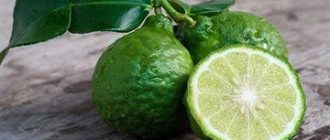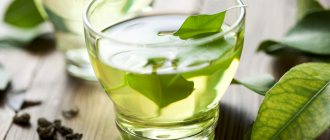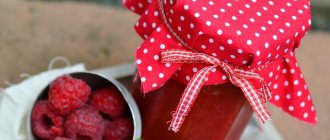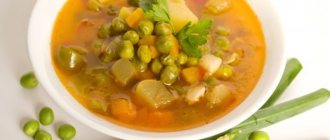Chemical and vitamin composition
About 90% of the total volume of raspberry fruits is water.
But, in addition to it, the berries contain glucose, sucrose, fructose, essential purines, nitrogenous substances, acids of organic origin (in particular, salicylic, citric, malic and folic), carotene, copper, iron, potassium salts, vitamins P, PP , C, E, groups B (B1, B2, B6), each of which has a certain positive effect on the body:
- folic acid, iron and copper have a beneficial effect on hematopoietic processes in the body;
- carotene takes part in the synthesis of vitamin A, which, in turn, affects metabolic processes in proteins and the normalization of vision;
- potassium enhances urine drainage and improves the condition of the cardiovascular system;
- B vitamins participate in metabolic processes and play an important role in the formation of proteins;
- vitamin E promotes fat metabolism;
- Vitamin PP ensures the normal course of biological oxidation processes.
Not only the composition of raspberry berries is useful, but also the constituent components of the leaves, flowers, shoots and even roots of the plant, so infusions, decoctions and teas are often prepared from them for a variety of problems.
Useful and harmful properties
All of the listed beneficial properties of raspberries are only the beginning of its positive characteristics. When preparing berries for the winter, the main emphasis is on the antimicrobial and antipyretic abilities of the plant, which is especially important during the period of mass spread of viral illnesses and colds .
- In addition, the fruits, shoots and even leaves of the plant can have the following effects on the human body:
- help stabilize digestive processes, eliminating problems with constipation, including for nursing mothers;
- activate regenerative processes in the body, thereby causing rapid healing of damaged tissues and effective blood renewal;
- promote rapid weight loss after childbirth, since raspberry fruits contain a minimum of calories;
- strengthen blood vessels and reduce cholesterol levels;
- normalize appetite;
- eliminate abdominal pain and reduce symptoms of nausea;
- normalize the condition of the skin (in particular, improve complexion);
- restore normal hormonal levels in the body;
- help get rid of diarrhea, for which you just need to prepare a decoction based on the leaves of the plant.
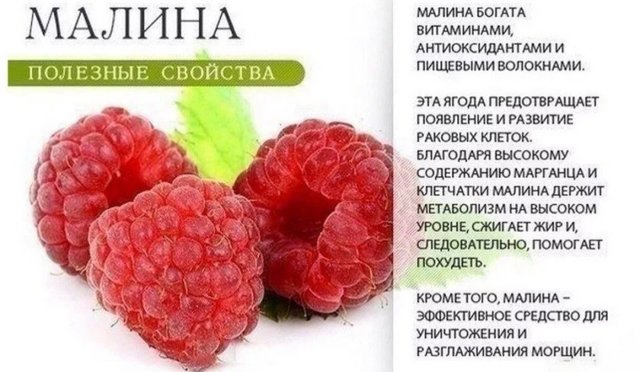
Unfortunately, despite all the indicated benefits of winter preparations or fresh raspberries, drinks and brews made from them can also have some negative consequences of consumption.
First of all, we are talking about people prone to allergic reactions or who have individual intolerance to the constituent components of the plant (for example, salicylic acid).
In addition, a large number of eaten berries can complicate the condition of gout and kidney diseases, not to mention the acute form of gastrointestinal ailments, which also occur in young mothers.
Important! If possible, light-colored foods should first be introduced into the diet of a nursing woman and only then proceed to the use of red and other bright berries or fruits.
Is it possible to eat raspberries while breastfeeding?
The answer to this question depends on the age of the child and the duration of lactation. Any food product at this time will have a certain effect on both the mother’s body and the developing body of the child, and in the first months of his life such an effect will be much more noticeable than after six months of active breastfeeding, which is something that any mother should definitely take into account.
Effect on lactation
Many women rightly consider raspberry tea a natural way to increase breast milk production; the main thing is to drink the drink warm and 30-50 minutes before putting the baby to the breast. At the same time, you should not abuse the infusion and it is enough to drink 1–2 cups of liquid per day, three to four times every seven days .
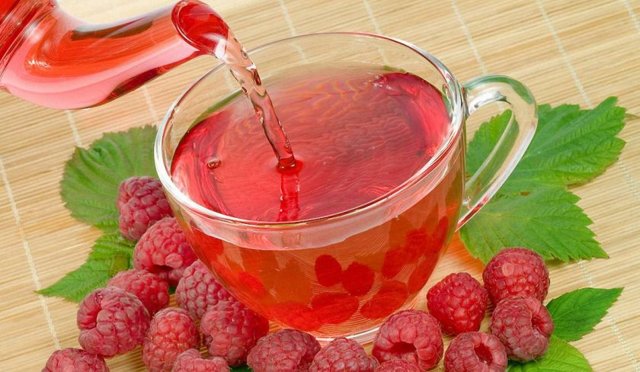
It is better to prepare the drink yourself, using only fresh fruits and avoiding artificial preservatives or additives. In addition, each new portion of tea should be freshly brewed, since if it is steeped for a long time, the product may spoil, and it should not be reheated.
If regular steamed leaves do not suit you, you can add the infusion to regular black tea, but only without chemical components, such as artificial flavors. Bagged teas are not suitable here, but natural leaf varieties will be very useful.
There is no need to heavily malt the finished drink, because raspberries, or especially the jam made from them, already contain enough sweetness that does not require the use of an additional portion of sugar.

When feeding a three-month-old baby or an even older child, you can add lemon to raspberry tea, which perfectly enhances the antiviral and anti-inflammatory effects of raspberries on the mother’s body. When delivered to the baby along with milk, the raspberry-lemon drink helps strengthen his body, which is especially important in the cold season.
At the same time, do not forget that each of the additional ingredients of raspberry tea must be introduced one by one, carefully studying the baby’s reaction to such additions. An increased amount of milk for breastfeeding cannot guarantee the complete absence of allergic manifestations, and the baby may not like the changed taste of food.
about the benefits and harms of raspberry jam.
Impact on the child
The effect of raspberries on the children's body is similar to the effect of berries on maternal health, however, it is important to take into account the greater tendency of children to allergic manifestations . Therefore, in order to get only the benefits from tea, it is important to use a dosed amount of berries when brewing it.
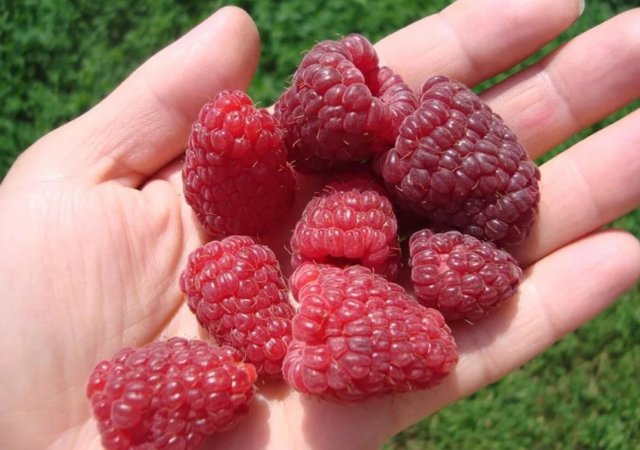
Fresh, a nursing woman can eat no more than a handful of raspberries per day, at the initial stages dividing this amount into several servings (they are eaten throughout the day).
Of course, you can use a little more raw material to prepare the drink, but even in this case, you need to increase its amount gradually (up to 100–150 g per day) in order to prevent the baby from developing a rash or diathesis.
After eating fresh berries, it is better to feed the baby no earlier than an hour later, trying to choose the morning hours . In this case, you will have time to observe the baby’s reaction to a new product, which cannot be said about night breastfeeding: both mother and baby will sleep, and any side effects may become noticeable only in the morning.
Contraindications
- Despite numerous positive reviews about the beneficial properties of raspberry fruits, the consumption of this product should be treated with caution by anyone who suffers from the following problems:
- elevated blood sugar levels;
- gout;
- problems with the kidneys and urinary ducts;
- ulcers and gastritis.
- In addition, women during lactation should not consume concentrated berry juice, which can be replaced with fruit drink, tea or all kinds of infusions based on fruits, leaves or shoots.
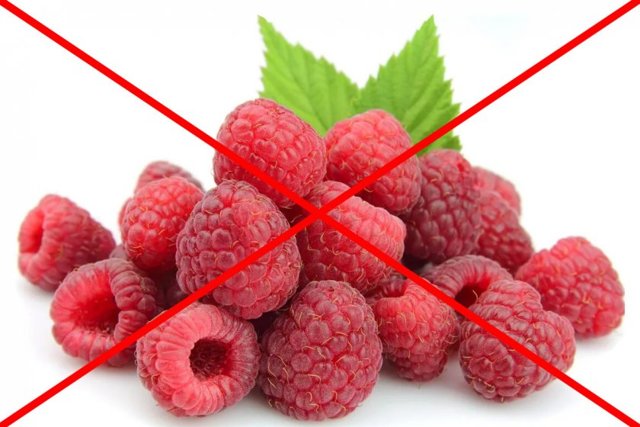
- As you can see, eating raspberries during breastfeeding is allowed, but in order to avoid possible negative consequences, you should make sure that there are no contraindications listed above and do not overuse the berries, trying to prepare drinks and consuming less fresh fruits.
Source: https://fermer.blog/bok/sad/malina/polza-i-vred-maliny/9205-malina-pri-gv.html
Contraindications
You should refrain from eating raspberries in the following cases:
- diabetes;
- gout;
- increased acidity;
- kidney diseases.
For gastritis and ulcers, it is undesirable to drink raspberry tea, as well as tinctures and concentrated juices, but fruit drinks are allowed.
Possible side effects in a nursing woman and child:
- skin rashes;
- redness of the skin;
- problems with stool;
- allergic rhinitis;
- itching
In all other cases, it is advisable to consult a specialist.
It doesn’t matter what kind of raspberries you include in your diet (red, yellow or black), the main thing to remember is that you cannot overuse them. And it is advisable to start eating raspberries only 3 months after giving birth. If, after consuming the product, the child begins to behave worse, or signs of allergies appear, then raspberries should be abandoned.
Raspberry jam for gw
Home » Jam » Raspberry jam for gw
A healthy nursing mother is a healthy baby that was recently born. Of course, the mother must be physically healthy, but her psychological mood also significantly affects the condition of the baby.
And many breastfeeding women are oppressed by numerous dietary restrictions. And how can you not be sad here, if it’s impossible, and it’s harmful.
For example, can a nursing mother have raspberry jam? In pre-pregnancy times, a woman would not even think about this question, she would simply open the jar and enjoy. Now it’s worth considering the needs of the baby.
Useful properties and risks
The good news is that raspberry jam is an extremely healthy product. The bad news is that such a delicacy causes, although small, the risk of allergies in the baby.
So can a nursing mother eat raspberries?
Many people recommend avoiding raspberries during breastfeeding. But it would be stupid to forget such a useful product. After all, it is much healthier for a mother to drink warm tea with raspberries during a cold instead of taking chemical medications. But, despite the many advantages, you should not lean too heavily on the berry. A large amount of acids and vitamin C is an undoubted advantage for most people, but not for a nursing mother. They can cause an allergic reaction in the baby. In order to avoid this, you need to very carefully introduce this berry into your diet. If the child feels well, there are no diaper rashes on the skin or redness, then you can eat the delicious berry without worry. But in small quantities. You only need to eat fresh berries or scalded ones with boiling water. Under no circumstances should you indulge in your favorite raspberry jam. It contains very little useful substances, but a huge amount of sugar. But it is the latter product that causes allergies in the child.
A handful every 2-3 days or raspberry tea will be a good help for mommy in supplying the body with vitamins and other substances. It is not uncommon for a woman to experience during feeding when, due to a change in diet, digestion is disrupted, constipation and problems with the toilet occur. In this case, raspberries are an excellent natural remedy for restoring the functioning of the gastrointestinal tract. It is better to eat a delicious berry than a pill prescribed by a doctor and containing a bunch of unknown chemicals.
But at the slightest sign of an allergy in your baby, you should immediately discard the product. This general principle applies not only to raspberries. The introduction of any new product into the diet requires caution and attention.
It is never clear what the little one will be intolerant of. If you don't like raspberries, you can try strawberries or cherries.
Introducing raspberries into the diet
This berry should be introduced into the diet very carefully. It is advisable to start with yellow raspberries. It is much less allergenic than red. And if everything goes well, then you can switch to a more familiar berry.
Can I have raspberries while breastfeeding?
The nutrition of a nursing mother is often associated with many restrictions. Some of the prohibitions concern fruits and berries, but in the summer season it is so difficult to resist enjoying juicy raspberries, strawberries or peaches. We have already written about whether a breastfeeding mother can eat watermelon, and today we will talk about raspberries while breastfeeding.
So, can a nursing mother have fresh raspberries? Let's study this issue in detail so as not to deprive ourselves of the vitamins and nutrients that are so necessary during breastfeeding.
Raspberries are not only tasty, but also very healthy. They contain a large amount of vitamins, pectin substances, essential oils, sucrose, as well as malic, citric and salicylic acids.
Useful properties of raspberries
The combination of all the chemicals contained in raspberries affects literally all systems of the body. It normalizes the body's hormonal levels, eliminates pain in the abdominal area and effectively improves overall well-being.
But this is just the beginning of the pleasant properties of raspberries:
- Anthocyanin in the berry strengthens the walls of blood vessels and capillaries;
- Reduces unpleasant sensations from joint pain;
- Maintains a cheerful mood;
- Normalizes the condition of hair and nail plates;
- Improves digestion and metabolic processes;
- Relieves dark circles under the eyes caused by lack of sleep;
- Strengthens the body's immune system;
- Eliminates vomiting and diarrhea;
- Cleanses the blood of toxins and removes potentially dangerous waste from it;
- Tones the skin with swelling and stretch marks;
- Lemon, apple and salicylic acid help destroy bacteria and germs;
- Lowers body temperature in case of illness.
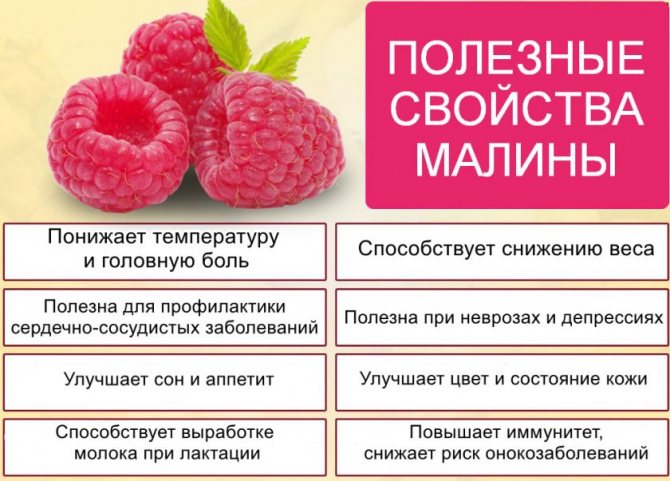
Got a cold? Don’t want to poison your baby with medications through breast milk? There is a folk remedy...
Lactating women, especially during periods of viral diseases, often wonder whether raspberry jam can be consumed by a nursing mother. After all, this is an excellent source of vitamins and many have been accustomed to using it to treat colds since childhood. Today we will talk about this product and find out when and how it can be consumed during breastfeeding.
The benefits of raspberries
Raspberries have long been considered a cure for many diseases. Raspberries contain salicylic acid, which acts as an antiseptic and anti-inflammatory agent.
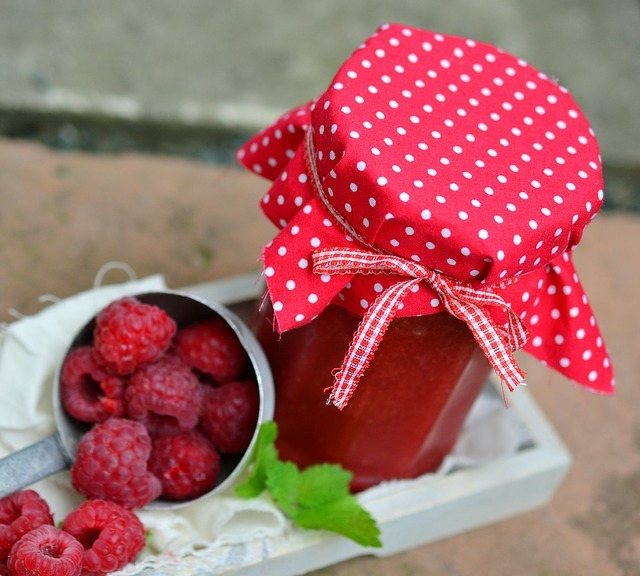
Raspberry jam in the diet of a nursing mother will help cope with colds, increase lactation and simply cheer up.
The berry is rich in manganese, iron, molybdenum, potassium, copper, cobalt, pectins and purines. This determines the following properties:
- normalization of water balance;
- improvement of muscle function;
- getting rid of swelling;
- improvement of blood composition;
- normalization of the reproductive system;
- improvement of protein metabolism and metabolism in general;
- normalization of liver function;
- removal of toxins from the body;
- improvement of skin condition.
Raspberry fruits contain beta-sitosterol, which prevents the deposition of cholesterol plaques in blood vessels. It helps against sclerosis. The presence of folic acid in berries prevents the development of leukemia. Iodine is good for the thyroid gland.
For a cold
The most famous property is considered to be the fight against colds. Nursing mothers love this remedy, since conventional medications for breastfeeding are often prohibited.
The berry contains a lot of vitamin C, which explains its effectiveness against ARVI. Using the product as jam reduces the effectiveness several times.
Raspberry fruits have a good diaphoretic and antipyretic effect, which is especially helpful in the treatment of colds.
At a temperature
Raspberries have a good diaphoretic and antipyretic effect, so it is recommended to drink it as tea at fever. If the thermometer readings are up to 38.5, you can cope with the problem only with healing tea. If the readings are high, you still need to use pharmaceutical drugs.
Drinks made from berries and leaves should be drunk warm. Too hot ones can, on the contrary, provoke an increase in temperature readings. Remember that the berry is capable of removing fluid from the body, so when treating a fever, you should additionally drink a lot of water to avoid dehydration.

If you have a fever and are breastfeeding, it is not advisable to take chemicals from the pharmacy. Raspberry jam will come to the rescue.
Improved lactation
Raspberry tea for nursing women is also useful because it improves lactation. It is believed that it stimulates the functioning of the mammary glands. It is recommended to drink a non-concentrated drink warm half an hour before feeding. Since raspberries are an allergen, consumption in large quantities is prohibited. It is best to drink 1-2 cups a day several times a week.
Possible harm during breastfeeding
Despite the fact that raspberry jam has many beneficial properties, there are a number of contraindications and possible adverse reactions that limit its use during breastfeeding. First of all, you should remember that such a product is a strong allergen, so the baby may develop a rash, itching, cough and other negative reactions.
A large amount of sugar in jam can cause bloating, stool problems, nausea and colic in infants.
Raspberries in the form of berries, rather than jam, should be chosen by people who are obese or losing weight due to their high calorie content. Due to the diuretic effect, the product is prohibited for people with impaired kidney function. Polyps and bronchial asthma are also contraindications for use.
Can a nursing mother eat raspberry jam?
Breastfeeding is not accompanied by strict restrictions. It is important to eat foods correctly and introduce them into your diet. Women often ask, is it possible to use jam while breastfeeding? Raspberry jam is allowed. It is very good for health, but it is an allergen, which forces you to adhere to special rules. When used, the product will not harm your baby.
In the first month after birth
The first month after the birth of a baby is a special time. During this period, the child’s gastrointestinal tract adapts to new nutritional conditions and the external environment. In the first month of a newborn’s life, it is not recommended to eat foods that can cause allergies or severe stress on the gastrointestinal tract, so eating raspberries and its derivatives is prohibited.
When and in what quantity is it possible?
Since the product is an allergen, it is recommended to introduce it into the diet after 3–5 months, but sometimes the doctor allows you to eat it earlier.
Most often, it does not cause an allergic reaction in the baby, passing through milk exactly after 3 months, when the baby gets used to the external environment.
Therefore, if you are interested in what sweets are possible when breastfeeding from 3 months, you can pay attention to this product.
For the first time, it is recommended to eat 1 teaspoon of jam with tea or water. Negative manifestations can usually be noticed within 1–2 days after introduction into the diet. In the case of such strong allergens, doctors recommend observing for about a week.
If you do not notice signs of allergies or problems with the gastrointestinal tract, you can gradually increase the dosage. The recommended amount is 1-2 tablespoons per day 3-4 times a week.
Raspberry jam can be eaten on its own, added to tea and other drinks, or used in cooking, for example, added to oatmeal.
What is dangerous for mother and baby?
The main danger of raspberries lies in the high probability of allergic reactions in a child . Due to their high sugar and purine content, berries are prohibited for diabetes and kidney disease.
The berry is not recommended for stool disorders - the slight laxative effect of the fruit can aggravate diarrhea in both the mother and the baby. Diseases of the gastrointestinal tract with high acidity in the acute stage are also a contraindication to the consumption of aromatic berries.
Caution should be exercised when using raspberry dishes if you are hypersensitive to salicylates.
Raspberries during breastfeeding: is it possible or not? — Breastfeeding from A to Z
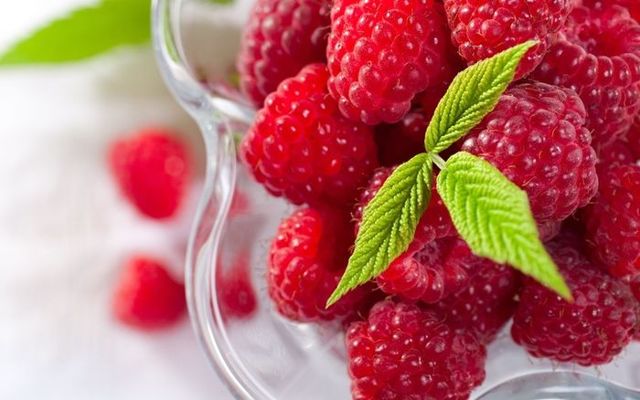
Is raspberry an enemy or a friend to a child?
There is an opinion among many pediatricians that eating raspberries during breastfeeding can cause allergies in the baby. This applies not only to raspberries, but also to other vegetables and fruits that are red in color. “Diathesis is inevitable,” they say.
The ban is associated, first of all, with the fact that the baby’s enzymatic system in the first three weeks after birth is imperfect. But the child is growing and the development of internal systems does not stand still, so the strict prohibitions of doctors should not apply to the entire period of guards.
As for a nursing mother, her diet should be based on the principle of “do no harm and do good,” from which we can conclude that a nursing mother can do anything, but:
- the products consumed must be of high quality, without dyes;
- what the mother did not eat during pregnancy should be introduced into the diet gradually, in small portions. The child's reaction is very important. If “new” products do not cause allergies, portions can be gradually increased.
You can eat raspberries while breastfeeding, but of course, there are exceptions to any rule, and there are some here too. If your baby is prone to allergies from birth, it is better to hold off on eating all red berries until the baby’s body is ready for such food.
Mothers with chronic diseases of the gastrointestinal tract (especially in the acute phase) or who have suffered late gestosis are also not recommended to eat raspberries.
Remember that lactation is not a disease. Don’t be too suspicious, but caution, as in any other matter concerning a small child, should always be present.
Beneficial features
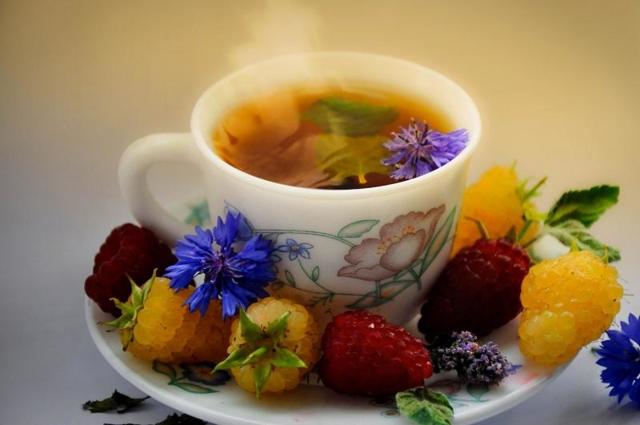
Let's debunk the myths
In the fall, most people rush to a jar of raspberry jam as a salvation from all troubles, forgetting that berries that undergo heat treatment in most cases lose their beneficial properties and vitamins. However, salicylic acid, which is a powerful natural antiseptic and part of raspberries, is preserved even during heat treatment.
This substance also passes into breast milk. Therefore, raspberries in any form are an excellent addition to drug treatment. But what do you do when a cold strikes in the fall? It’s all very simple, just add 10–15 dried raspberries to the tea; you need to steep this drink for no more than three minutes.
Remember that it is better for a nursing mother not to get sick in the fall!
To summarize, it must be said that what is used wisely and in moderation is useful. First of all, think about the baby’s health!
Source: https://chest-baby.my1.ru/news/malina_pri_grudnom_vskarmlivanii_mozhno_ili_nelzja/2017-02-24-132
Cooking recipes
There are three relatively mild recipes that can be used while breastfeeding.
Of course, no one is canceling store-bought pharmaceutical products, for example, lozenges with natural raspberries. But it’s better to make the remedy at home to completely eliminate the possibility of potent substances getting into the blood and stomach.
Mask for strengthening hair and nails
About two tablespoons of raspberry juice - easily obtained using a masher or blender - is mixed with a tablespoon of fresh olive oil, a chicken egg and two tablespoons of pea flour.
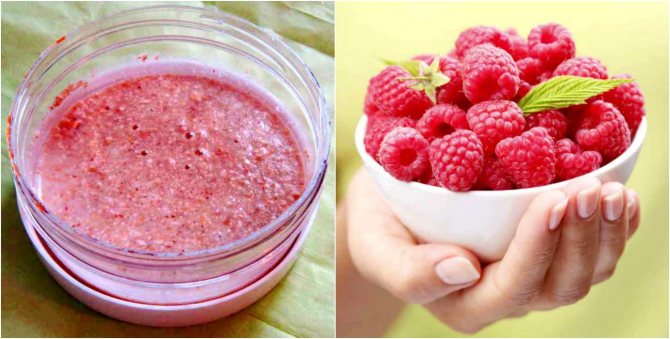
It is recommended to beat the future mask using kitchen appliances. The resulting mixture is applied to damp hair and left on for 30 minutes. Afterwards it is washed off with cool running water and shampoo.
You can use the mask already in the first month of your baby’s life.
Raspberry jam
To make jam, you need to wash 1.5 kilograms of berries and remove bugs, cuttings and leaves. To rinse, you can hold the raspberries in a colander for up to 10 minutes at a time.
Raspberries are moved to a pan made of copper, stainless steel or brass. Next, it is kneaded with a masher and covered with sugar in a 1:1 ratio. The future raspberry jam should brew for about 120 minutes.

After the specified period, put the pan with raspberries on the fire and cook, gradually stirring and skimming the foam from the surface. The finished jam must be sorted into jars and rolled up.
Raspberry infusion
Raspberry infusion can be used during breastfeeding. It is made from 900 milliliters of fresh drinking water, 100 grams of dry raspberries.
Pour boiling water over the raw berries, leave for no more than half an hour, and then drink a glass of water before bed. The infusion is used when a child is allergic, but there is no information about reactions to the berries.
It is the use of a weak agent on raspberries that will allow you to understand how its chemical composition affects the body. In this case, the child will not be at risk of anaphylactic shock or other severe reaction.
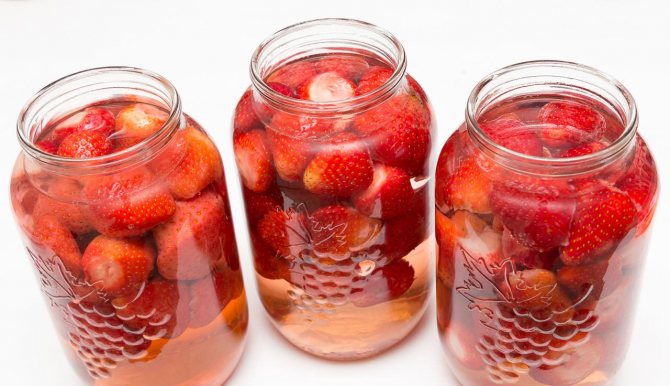
Raspberry leaf tea
Tea is brewed from dry or fresh leaves; you will need at least two tablespoons. This is approximately 30-45 grams; to improve the taste, it is recommended to cut the raw material or grind it to a powder state.
The leaves are poured with 500 milliliters of water at a temperature of 90-95 degrees Celsius. Then the drink is infused for up to 20 minutes, filtered using tea calico and consumed orally.
To enhance the strengthening properties of this herbal tea, add a few tablespoons of bee honey. Have you tried the combination of honey and tea on raspberry leaves?
How to choose jam in a store?
If you choose a store-bought product, pay attention to the expiration date. Well-prepared raspberry jam can be stored unopened for up to 2 years. In addition, carefully study the composition. Real jam contains only raspberries, sugar, and water. Please note that the berries should come first.
Pay attention to the appearance of the jam. It must be packaged in glass containers. The consistency should be uniform in appearance, without lumps. If the product is candied, it means that the manufacturing technology was violated.
Reviews
Honestly, I ate raspberry jam throughout my pregnancy and breastfeeding. My grandmother said that I couldn’t take medicine, but these were good vitamins and would help with colds. I didn’t even think that it was impossible. I just found out recently. There were no allergies.
My baby had such a severe allergy to raspberries. I got sick, since medications for breastfeeding women are not recommended, so I decided to treat myself with raspberries. Oh, how I regretted it. Not only am I sick, but the child is itching and screaming. Bad experience((
